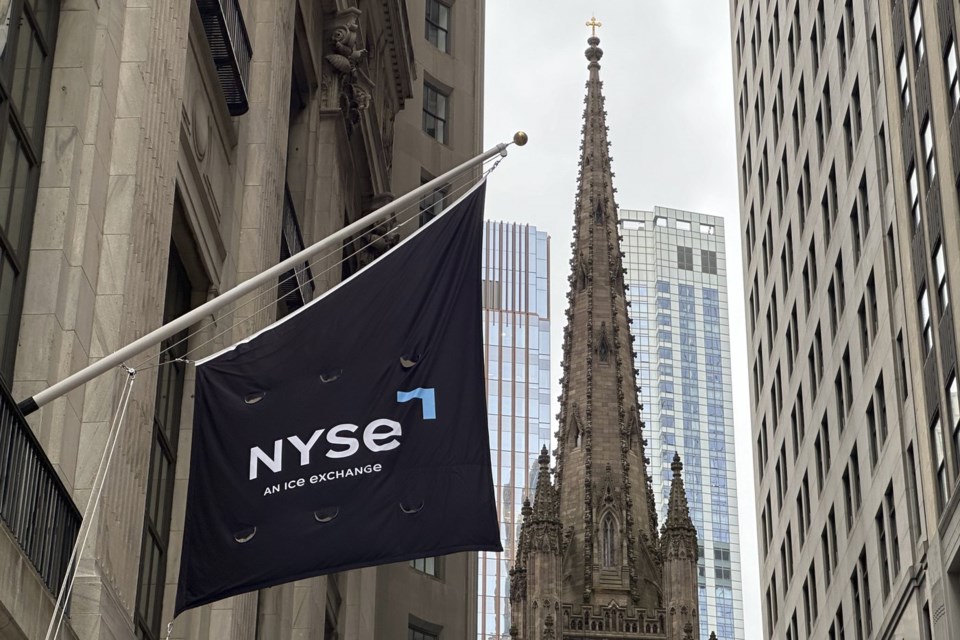NEW YORK (AP) — Most U.S. stocks slumped after strong economic reports raised the possibility of interest rates staying painfully high. The weakness was widespread on Thursday and overshadowed another blowout profit report from market heavyweight Nvidia. The S&P 500 fell 0.7% and pulled further from its record set earlier this week. The Dow Jones Industrial Average tumbled more than 600 points, and the Nasdaq composite slipped 0.4%. Treasury yields rose in the bond market after reports showed accelerating growth for U.S. business activity and a resilient job market. Higher yields weighed on much of the market, particularly dividend payers like real-estate stocks.
THIS IS A BREAKING NEWS UPDATE. AP’s earlier story follows below.
NEW YORK (AP) — In the latest example of how good news for the economy can be bad for Wall Street, most U.S. stocks slumped Thursday after strong economic reports raised the possibility of interest rates staying painfully high. The weakness was widespread and overshadowed another blowout profit report from market heavyweight Nvidia.
The S&P 500 was down 0.8% in afternoon trading and pulling further from its record set earlier this week. The Dow Jones Industrial Average was down by 623 points, or 1.5%, as of 2:30 p.m. Eastern time, and the Nasdaq composite was 0.4% lower.
Stocks were struggling under the weight of higher yields in the bond market. Treasury yields cranked up the pressure following the stronger-than-expected reports on the U.S. economy, which forced traders to rethink bets about when the Federal Reserve could offer relief to financial markets through lower interest rates.
One preliminary report suggested growth in U.S. business activity is running at its fastest rate in more than two years. S&P Global said in its report that growth improved for businesses not only in the services sector but also in beaten-down manufacturing.
A separate report, meanwhile, showed the U.S. job market remains solid despite high interest rates. Fewer workers applied for unemployment benefits last week than economists expected, an indication that layoffs remain relatively low.
Treasury yields had been close to flat following the joblessness report but turned higher immediately after the report on business activity, which also suggested selling prices remain stubbornly high.
With upward pressure on inflation now coming from both the manufacturing and service sectors, it suggests "the final mile down to the Fed’s 2% target still seems elusive,” according to Chris Williamson, chief business economist at S&P Global Market Intelligence.
The Fed is trying to pull off the difficult feat of slowing the economy enough through high rates to get inflation fully under control but not so much that it forces a painful recession. It’s been holding its main interest rate at the highest level in more than two decades to do so, and Wall Street is itching for some easing.
A hotter-than-expected economy could push the Federal Reserve to wait longer before cutting interest rates, after traders already ratcheted back their earlier, too-optimistic forecasts. What’s worse, it could force the Federal Reserve to ultimately raise rates more and cause a deep recession to get inflation to fully succumb.
Hopes are still high for at least one cut to rates this year. But traders pulled some back on some of those bets following Thursday's reports.
The yield on the 10-year Treasury, which helps set rates for mortgages and other loans, rose to 4.47% from 4.43% late Wednesday. The two-year yield, which more closely tracks expectations for action by the Federal Reserve, climbed to 4.93% from 4.87%.
That helped send stocks of utilities and real-estate companies to some of the market's sharpest losses. When interest rates are high, bonds pay more in interest and can peel away income-seeking investors who would otherwise buy utilities or real-estate investment trusts for their high dividends.
American Water Works sank 3.6%, and Boston Properties fell 3.5%.
The sharpest single drop within the S&P 500 came from Live Nation Entertainment, which sank 8.2% after the Justice Department accused it and its Ticketmaster business of running an illegal monopoly over live events in the country.
VF Corp., the company behind The North Face, Vans, Timberland and other brands, fell 3.5% after reporting a loss for the latest quarter, along with weaker revenue than analysts expected.
They helped to more than offset a 9.3% leap for Nvidia, which delivered its latest knockout profit report late on Wednesday. Its revenue surged 262% in the latest quarter from a year earlier, and its profit leaped an eye-popping 629%. The company’s chips are helping to train artificial-intelligence systems, and demand for them has been voracious.
Nvidia also increased its dividend as its CEO, Jensen Huang, touted how “the next industrial revolution has begun.”
Concern has grown that Wall Street’s frenzy around the potential for AI has created a bubble where prices have soared too high and expectations have grown too tough. But Nvidia's continued skyrocketing growth tamped down some of the criticism.
In stock markets abroad indexes were mixed across Europe and Asia. Japan’s Nikkei 225 rose 1.3% in part on strength for semiconductor-related companies following Nvidia’s powerful profit report. Indexes fell 1.7% Hong Kong and 1.3% in Shanghai amid questions about whether a fresh flurry of policies to help China’s troubled property sector will suffice to end the industry’s crisis.
___
AP Business Writers Yuri Kageyama, Matt Ott and Alex Veiga contributed.
Stan Choe, The Associated Press



